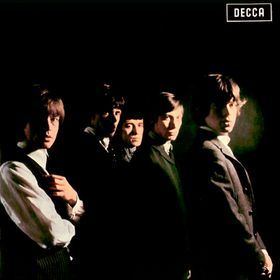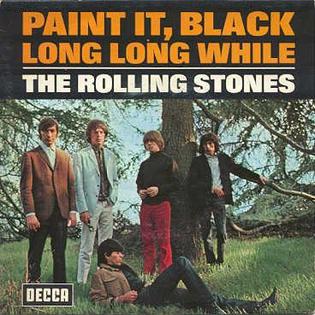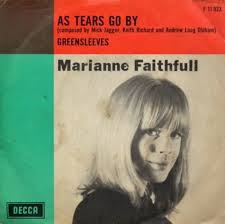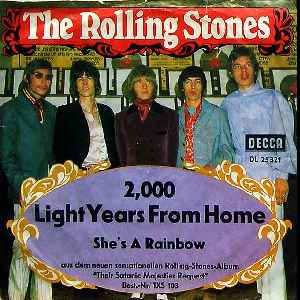
"Jumpin' Jack Flash" is a song by the English rock band the Rolling Stones, released as a non-album single in 1968. Called "supernatural Delta blues by way of Swinging London" by Rolling Stone magazine, the song was perceived by some as the band's return to their blues roots after the baroque pop and psychedelia heard on their preceding albums Aftermath (1966), Between the Buttons (1967) and especially Their Satanic Majesties Request (1967). One of the group's most popular and recognisable songs, it has been featured in films and covered by numerous performers, notably Thelma Houston, Aretha Franklin, Tina Turner, Peter Frampton, Johnny Winter, Leon Russell and Alex Chilton. To date, it is the band's most-performed song; they have played it over 1,100 times in concert.

"Sympathy for the Devil" is a song by English rock band the Rolling Stones. The song was written by Mick Jagger and credited to the Jagger–Richards partnership. It is the opening track on the band's 1968 album Beggars Banquet. The song has received critical acclaim and features on Rolling Stone magazine's "The 500 Greatest Songs of All Time" list, being ranked number 106 in the 2021 edition.

"Not Fade Away" is a song credited to Buddy Holly and Norman Petty and first recorded by Holly and his band, the Crickets.

The Rolling Stones is the debut studio album by the English rock band the Rolling Stones, released by Decca Records in the UK on 17 April 1964. The American edition of the LP, with a slightly different track list, came out on London Records on 29 May 1964, subtitled England's Newest Hit Makers, which later became its official title.

"Ruby Tuesday" is a song recorded by the Rolling Stones in 1966, released in January 1967. The song became the band's fourth number-one hit in the United States and reached number three in the United Kingdom as a double A-side with "Let's Spend the Night Together". The song was included in the American version of Between the Buttons.

"Paint It Black" is a song by the English rock band the Rolling Stones. A product of the songwriting partnership of Mick Jagger and Keith Richards, it is a raga rock song with Indian, Middle Eastern and Eastern European influences and lyrics about grief and loss. London Records released the song as a single on 7 May 1966 in the United States, and Decca Records released it on 13 May in the United Kingdom. Two months later, London Records included it as the opening track on the American version of the band's 1966 studio album Aftermath, though it is not on the original UK release.

"Let's Spend the Night Together" is a song written by Mick Jagger and Keith Richards, and originally released by the Rolling Stones as a double A-sided single together with "Ruby Tuesday" in January 1967. It also appears as the opening track on the American version of their album Between the Buttons. The song has been covered by various artists, including David Bowie in 1973.

"As Tears Go By" is a song written by Mick Jagger, Keith Richards and Rolling Stones' manager Andrew Loog Oldham. Marianne Faithfull recorded and released it as a single in the United Kingdom in 1964. Her song peaked at number nine on both the UK and Irish singles charts. Later, the Rolling Stones recorded their own version, which was included on the American album December's Children . London Records released it as a single, which reached number six in the Billboard Hot 100 singles chart.

"Get Off of My Cloud" is a song by the English rock band the Rolling Stones. It was written by Mick Jagger and Keith Richards for a single to follow the successful "(I Can't Get No) Satisfaction". Recorded in Hollywood, California, in early September 1965, the song was released in September in the United States and October in the United Kingdom. It topped the charts in the US, UK, Canada, and Germany and reached number two in several other countries.
"Sittin' on a Fence" is a song written by Mick Jagger and Keith Richards of the English rock band the Rolling Stones. The song was given to the singing duo Twice as Much, who released it as their debut single in May 1966. This version became a Top 40 hit on the UK Singles Chart, and also received some attention in the United States, where it charted on the Billboard Bubbling Under Hot 100 Singles chart.

"Out of Time" is a song by the Rolling Stones, first released on their 1966 album Aftermath. The most commercially successful version of the song was by Chris Farlowe, an English solo artist. Farlowe's single, produced by Mick Jagger, peaked at number one in the UK Singles Chart on 28 July 1966 and stayed at the top for one week. A shorter alternative mix of the Rolling Stones' recording was released in the US in 1967 on the album Flowers. A third version featuring Jagger's lead vocal and the orchestration and backing vocals from Farlowe's cover version was released on the 1975 rarities album Metamorphosis and as a single.

"Have You Seen Your Mother, Baby, Standing in the Shadow?" is a song by the English rock band the Rolling Stones. Written by Mick Jagger and Keith Richards, it was recorded in the late summer of 1966 during early sessions for what would become their Between the Buttons album. It was the first Stones single to be released simultaneously in both the UK and the US, and reached number five and number nine on those countries' charts, respectively.

"Mother's Little Helper" is a song by the English rock band the Rolling Stones. A product of Mick Jagger and Keith Richards' songwriting partnership, it is a folk rock song with Eastern influences. Its lyrics deal with the popularity of prescribed tranquilisers like Valium among housewives and the potential hazards of overdose or addiction. Recorded in December 1965, it was first released in the United Kingdom as the opening track of the band's April 1966 album, Aftermath. In the United States, it was omitted from the album and instead issued as a single in July 1966 during the band's fifth American tour. The Rolling Stones' twelfth US single, "Mother's Little Helper" spent nine weeks on the US Billboard Hot 100, peaking at No. 8, and it reached No. 4 on both Record World and Cash Box's charts.
"Ride On, Baby" is a song by English rock band the Rolling Stones. It was written by Mick Jagger and Keith Richards in 1965. It was first released as a single by Chris Farlowe in October 1966 and reached No. 31 on the British charts. The Rolling Stones' own version appeared a few months later on Flowers, an album released only in the US in June 1967. It was recorded during the Aftermath sessions in December 1965.
Yesterday's Papers is a song by the Rolling Stones from their 1967 album, Between the Buttons. It was the first song that Mick Jagger wrote by himself for the group. It appears as the opening track on the UK version of the album and on the US version as the second track.

"Dandelion" is a song by the English rock band the Rolling Stones, written by Mick Jagger and Keith Richards, and first released as a B-side to "We Love You" in August 1967. As recently as October 2023 Keith Richards confirmed that John Lennon and Paul McCartney sing backing vocals. Billboard described the single as "an easy beat rocker with good story line."

"The Last Time" is a song by the English rock band the Rolling Stones featuring the Andrew Oldham Orchestra, and the band's first original song released as an A-single in the UK. Written by Mick Jagger and Keith Richards, and recorded at RCA Studios in Hollywood, California in January 1965, "The Last Time" was the band's third UK single to reach number one on the UK Singles Chart, spending three weeks at the top in March and early April 1965. It reached number two in the Irish Singles Chart in March 1965, and was released on the US version of the album Out of Our Heads on 30 July 1965.

"19th Nervous Breakdown" is a song recorded by the English rock band the Rolling Stones. Written by Mick Jagger and Keith Richards, it was recorded in late 1965 and released as a single in February 1966. It reached number 2 on both the US Billboard Hot 100 and Britain's Record Retailer chart, while topping the charts compiled by Cash Box and NME. In the UK, it broke the band's streak of consecutive number-one singles that had started with "It's All Over Now" (1964).

"2000 Light Years from Home" is a song by the English rock band the Rolling Stones, released on their 1967 album Their Satanic Majesties Request. Written by Mick Jagger and Keith Richards, it also appeared as the B-side to the American single "She's a Rainbow", and charted as a single in Germany.
"Think" is a Mick Jagger and Keith Richards composition that first appeared as a Chris Farlowe single which reached No 37 on the UK Singles Chart in January 1966.
















